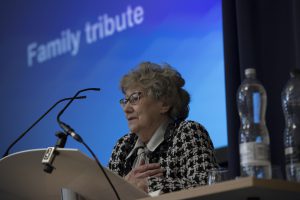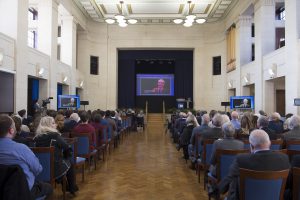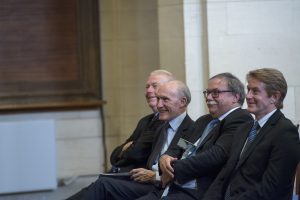December 14, 2017, by Liz Cass
“We miss him dearly” – tributes to Sir Peter Mansfield
He was the pioneering scientist who invented Magnetic Resonance Imaging (MRI), saving the lives of countless cancer patients and others across the world by transforming medical history.
But Sir Peter Mansfield, who died earlier this year, was an “honest and modest” man who tended not to seek the limelight.
 At a special service honouring his memory Sir Peter’s widow gave an insight into what privately drove him to discoveries which led to a knighthood and Nobel Prize.
At a special service honouring his memory Sir Peter’s widow gave an insight into what privately drove him to discoveries which led to a knighthood and Nobel Prize.
Lady Jean Mansfield delivered a loving personal account of life with her husband, who died in February, aged 83.
She said: “Peter was always inquisitive and he shone in everything – he was so eaten up with life and with new things.
“The reason he was such a good family man was that he hated sport, didn’t drink and never went out with the boys! We miss him dearly – he was my rock. He was a kind and gentle man, and a very modest man.”
 She added that Sir Peter could be fair – but firm – with students, setting them high standards.
She added that Sir Peter could be fair – but firm – with students, setting them high standards.
“I used to say to him ‘why do you do it?’, and he said ‘because I want the best for them’,
“‘If they have the best, if they can leave here with best degree, then they are going to make it’. ”
The memorial event was hosted by Professor Shearer West, Vice-Chancellor of the University of Nottingham, whose staff Peter Mansfield joined as a lecturer in 1964. Over the next five years he was promoted to senior lecturer, reader then Professor of Physics, from which he retired in 1994.
His greatest achievement was his work in the field of MRI and the development of scanners that have helped save or improve the lives of countless thousands of men, women and children.
MRI scanners create images of organs within the body. There are now thought to be 22,000 such devices worldwide, used for some 60 million scans a year.
 Sir Peter famously volunteered to be the first person to have his entire body scanned. It was at first feared the procedure, while effective at scanning, may cause a heart attack.
Sir Peter famously volunteered to be the first person to have his entire body scanned. It was at first feared the procedure, while effective at scanning, may cause a heart attack.
But he survived with no ill-effects and the technology is now in hospitals worldwide having changed medical science.
The memorial event included warm tributes from former vice-chancellor Sir David Greenaway, from Sir Peter’s former PhD student Peter Morris, now a professor and former head of the university’s Sir Peter Mansfield Imaging Centre, and from colleague and friend Dr Barry Chapman.
Sir David said that for all the international honours bestowed on the scientist, local honours, such as his appointment as Honorary Freeman of Nottingham, meant just as much to him: “He was a great visionary, a great scientific leader but also a very fine person.”
Prof M orris spoke of Sir Peter’s “dogged determination to succeed.” Another contributor was Prof John Savill, chief executive of the Medical Research Council, a body whose funding was central to the success of MRI research. Sir Peter’s work, he said, “had truly changed lives.”
orris spoke of Sir Peter’s “dogged determination to succeed.” Another contributor was Prof John Savill, chief executive of the Medical Research Council, a body whose funding was central to the success of MRI research. Sir Peter’s work, he said, “had truly changed lives.”
No comments yet, fill out a comment to be the first

Leave a Reply